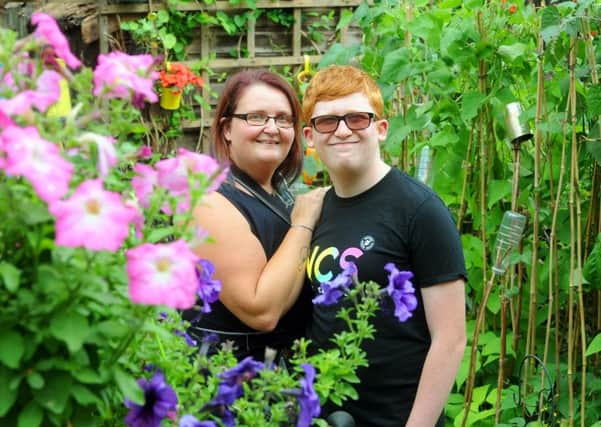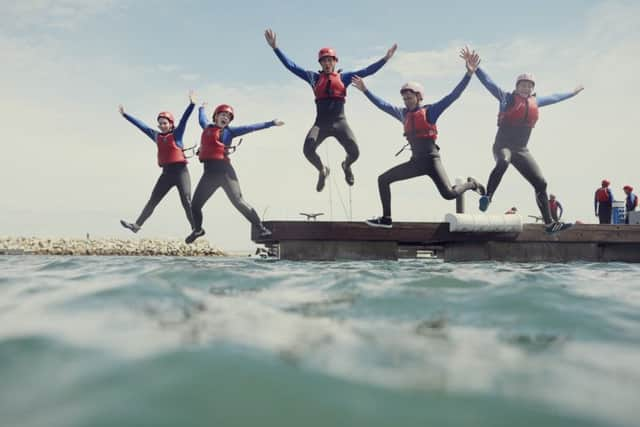How National Citizen Service scheme helped Bradford teenager with autism


It was June when Bradley Smith made the 250 mile journey from his home in Bradford to a small sea loch in Scotland. The 16-year-old would spend four nights there with a team of young people he had never met before, facing outdoor adventure challenges including climbing and river walking.
For a young man with autism, who thrives on routine and struggles to integrate into social situations, it was a big step. But it is one that has marked a turning point for Bradley, boosting his confidence and independence, and providing him with a new circle of friends.
Advertisement
Hide AdAdvertisement
Hide AdIt was a desire, in his words, “to get some social skills” that prompted Bradley to sign up to the National Citizen Service (NCS) scheme, a three to four week programme available for 15 to 17-year-olds in England and Northern Ireland.


His stay in Loch Goil was followed by a residential in university accommodation in Huddersfield, designed to help prepare the group for independent living.
The programme finished with a social action element, in Bradley’s case a community project to clear up part of a suburb in his home city, and for him another milestone - getting there and back each day was the first time he had ever caught a bus on his own.
“It definitely improved my social skills and I have also been trying a lot more new things,” he says, having made new friends on the scheme. “I’m definitely feeling a lot more independent.” Describing the scheme as a “once in a lifetime opportunity”, he adds: “It will improve so many things about you that you didn’t even know you could improve on. For all intents and purposes, this is here to make everyone better people.”
Advertisement
Hide AdAdvertisement
Hide AdThe changes in Bradley, who previously kept to a small trusted circle, are evident to his mother Ellie as he takes on new personal challenges.
In the last month, her son has, for the first time outside of the programme, taken a bus into the city centre, spent time there on his own and travelled back, something most 16-year-old’s would take in their stride. “Six weeks ago, that would not have happened,” Ellie says. “His confidence is massive.”
The aim of the NCS, established in 2011 under then Prime Minister David Cameron and funded largely by the Government, is to tackle “some of the biggest social challenges in our country”. Creating more integrated, and cohesive communities is one of its objectives, alongside developing skills in young people for life and work.
Through its social action element, it also aims to empower young people to make a difference in their communities and foster a sense of social responsibility for the future. More than 480,000 people have taken part to date.
Advertisement
Hide AdAdvertisement
Hide Ad“We build bridges across social divides and ladders to opportunity,” Michael Lynas, chief executive of the NCS Trust, set up in 2013 by the Office for Civil Society (OCS) to manage the programme outside Government, writes in ‘The Little Book of NCS.
“We bring young people together in common purpose to change their perspectives and lives for good. We push them hard to see what they can achieve, smashing the self-doubt that holds too many back. Above all we try to show them that life is not a spectator sport. By designing and delivering their own social action projects, NCSers learn that they can make their mark on the world around them.”
In 2016, NCS programmes delivered up to £2.42 in social value for every £1 spent, according to The NCS 2016 Evaluation Report, published last year, after The Department for Digital, Culture, Media and Sport commissioned an independent look at the programme. But the NCS is not without its critics.
Just last week, councils lambasted the scheme, saying only a small number of eligible young people take part despite hundreds of millions of pounds of investment, and calling for some of the cash to be diverted to local authorities instead for provision for young people.
Advertisement
Hide AdAdvertisement
Hide AdA total of £634m, 95 per cent of the Government’s youth services budget, was spent on the programme between 2014/15 and 2017/18, according to the Local Government Association (LGA), which represents 370 councils in England and Wales. But 2016 figures suggest only 12 per cent of eligible youngsters - 93,000 - took part, with take-up in some areas as low as four percent, they claim.
“A time-limited programme of work cannot provide the trusted, longer-term relationships that are a valued element of youth work, and that are needed by some young people to develop the self-esteem, confidence and skills to take part in such programmes,” Anntoinette Bramble, chairwoman of the LGA’s Children and Young People Board, says.
“Councils have been forced to cut important services for thousands of young residents in recent years as a result of increasingly squeezed budgets, so it is wrong that nearly all of the Government’s funding for youth services is being spent on a very short programme which attracts only a small number of participants.”
It is not the first time the scheme, self-described as “the fastest growing youth movement in the country in a century”, has come under fire.
Advertisement
Hide AdAdvertisement
Hide Ad“The cost per participant has been higher than anticipated and needs to fall”, a National Audit Office report, published in January 2017, reads, referencing £1,863 as an expected price per individual in 2016.
Participation, it says, was not increasing as fast as the NCS Trust and OCS hoped, “with none of the annual targets being met since 2010”. “To demonstrate value for money, the OCS and the Trust now need to show they can grow NCS as intended and run it at a more affordable cost to the taxpayer,” the report summarises, though it does acknowledge the positive effect participating has on young people.
The future of the programme could be called into doubt, an inquiry into the NCS published two months later by the Public Accounts Committee states, if the scheme does not meet its “ambitious” targets for increasing participation and achieve its long-term societal aims, at a cheaper cost per person.
Ellie, 38, paid £50 for Bradley, who hopes to have a medical career, to take part in the scheme, which was run by charity The Challenge Network, one of several providers nationwide. The change in her son has been worth it but she believes the NCS is value for money on more than one level. “Some of the [social action] projects are massive,” she says. “And those things make a difference to communities where they wouldn’t normally get the staff and the people to do things like that.
Advertisement
Hide AdAdvertisement
Hide Ad“I work in a school and I see the difference that community access makes to young people, particularly young people with additional needs...[the NCS shows] you can go and you can do it and you can make a difference to you and to other people. That’s huge.”
‘Investment in next generation’
“It’s hard to put a pounds and pence value on a young person whose attitude to themselves and the world around them has been transformed,” a spokeswoman for the scheme told The Yorkshire Post. “NCS is an investment in the next generation.”
She said financial safeguards are in place to protect public cash and delivering “value for money” and “operating as efficiently as possible” is “embedded” in NCS culture.
An independent report, published earlier this year by researcher James Laurence, with the University of Manchester and Nuffield College at the University of Oxford, found the scheme had a positive impact on social integration of young people from all backgrounds, particularly those from the most segregated communities.